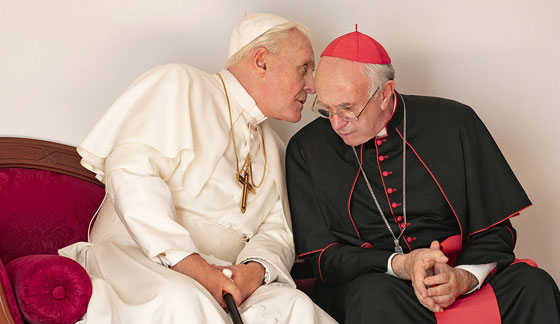Starring: Jonathan Pryce, Anthony Hopkins, Juan Minujin
Directed By: Fernando Meirelles
Rated: PG-13
Running Time: 126mins
Netflix
In 2013, the Catholic church faced a prospect it had not dealt with in 600 years when Pope Benedict XVI decided to step down as head of the Catholic Church. Jorge Mario Bergoglio was named as his successor, taking the title of Pope Francis. The official reason Benedict gave was declining health but he also did so in the face of mounting progressive movements among the global congregation as well as the rampant allegations of sexual abuse from clergy. In Netflix’s new film, The Two Popes, writer Anthony McCarten (“Darkest Hour”) stages an imagined meeting of the minds between Benedict and Bergoglio before this changing of the guard. Each of the men having crises of faith and trying to convince the other to keep or take on the title, respectively. Fortunately for director Fernando Meirelles, acting legends Anthony Hopkins and Jonathan Pryce stepped in to play these two. Unfortunately for viewers, their discussions do not dominate the entire film as you might hope nor do those talks address the church scandals in a meaningful way. That Meirelles’s film manages to tread through such tonally rocky terrain without more of an issue is down to great performances from Pryce and Hopkins.
Meirelles’s film opens amidst the death of Pope John Paul II and the ensuing 2005 papal conclave. The highly secretive process requires a super majority of the cardinals convening in Rome to elect a new pope. Publicly it was a spectacle in which crowds gathered in St Peter’s Square in eager anticipation of seeing white smoke to signal that choice had been made. The interior specifics of this conclave were under official oaths of secrecy. The film brings this all to vivid life within a recreation of the Vatican and introduces Bergoglio (Pryce) and Ratzinger (Hopkins) as opposing roads for the church to take at this crucial moment in time. Ratzinger is the more conservative of the two and glad-hands the other attendees like a politician while Bergoglio downplays talk from his peers who insist he is also a favorite. Ratzinger, redubbed Benedict, wins the votes.
Anthony McCarten’s script is based on his own stage play of this story and the best parts of this film felt like a stage production. The film easily moves from the spectacle of the conclave to the intimate summit between Hopkins and Pryce with Bergoglio seeking to tender his resignation from a Benedict who refuses to grant the request. Hopkins plays Benedict here with an air of mischief that lifts all their interactions. Bergoglio is pressing Benedict with his sincere desire to leave while Benedict brushes him off and inconveniences him at every turn. Their dialogue is also peppered with charming little old man moments. Bergoglio being the more “in touch” of the two brings both ABBA and the Beatles into the discussion for example. But once the gravity of Benedict wanting to leave takes priority–he speaks of losing touch with the voice of god–and Bergoglio’s reluctance has to be supported by how he got to where he is, the film drags. As interesting as it is and as capable an actor Juan Minujín is at playing the younger version of Pryce in war torn Argentina, it shifts the focus of the film down in taking it entirely through his past.
It’s also jarring to have the two old men watching the World Cup as though they’re in a set up from Michael Winterbottom’s The Trip while literally dropping out the audio of Benedict confessing regarding the abuse scandal later in the film. Such a jarring decision when we’ve already seen a lot of Bergoglio’s rough past, made me wonder if they knew acknowledging this darkness was a bridge too far in tone, your mileage may vary. Either way, I was grateful to see these two acting legends share the screen as much as they did.
The Two Popes is now streaming on Netflix


